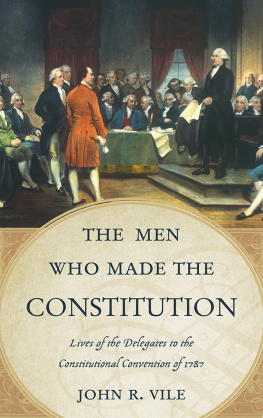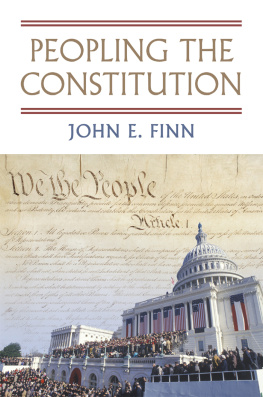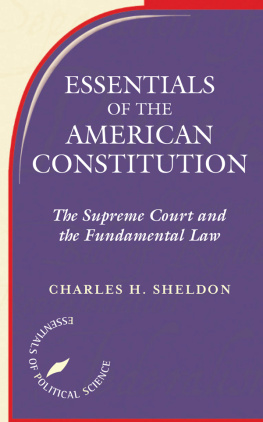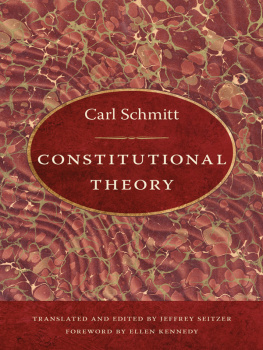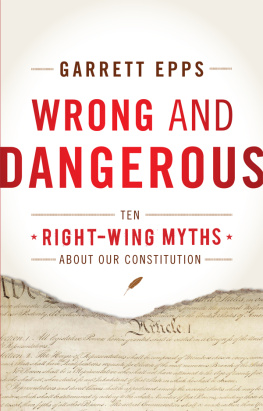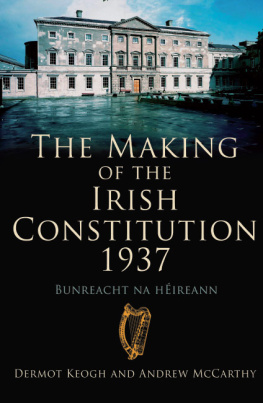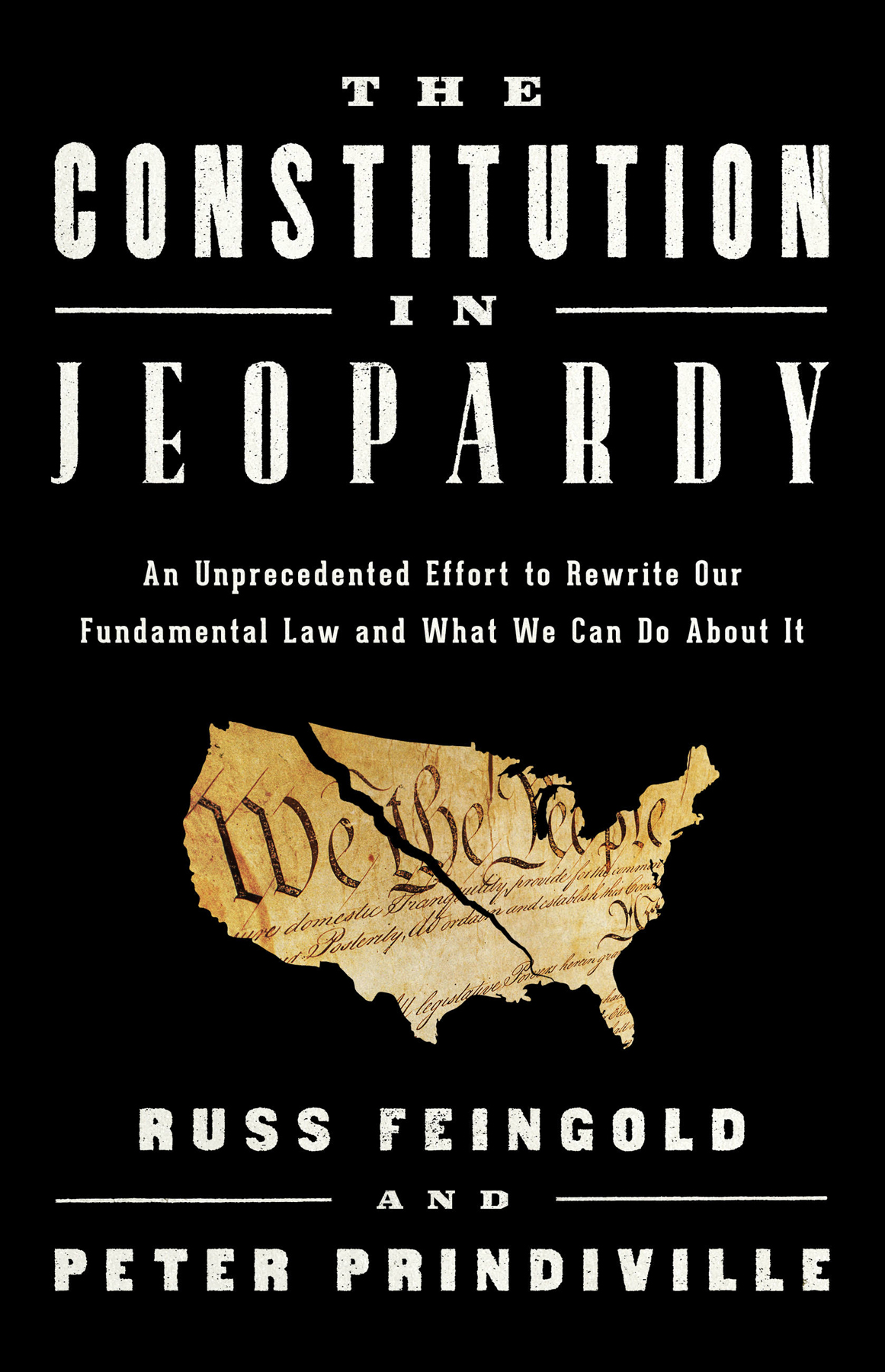Praise for
The Constitution in Jeopardy
Only a small number of Americans know what an Article V constitutional convention is. That needs to changeand fast. Feingold and Prindiville expose the underbelly of a national movement to overhaul the United States Constitution and radically change the nature of our democracy. Secrecy is their best friend, so patriotic citizens who want our Republic to survive must read this book.
Larry Sabato, professor and director of the center for politics, University of Virginia
A well-crafted book about the history, relevance, challenges, and future of the Constitutions amendment process. This book is for all citizens who want to better understand our Constitution and why it is the core and soul of our democracy.
Senator Chuck Hagel, former secretary of defense
This book masterfully and accessibly canvases history, portrays current events, and sketches out a variety of possible futures for this nations basic lawand thus for the United States itself. I would call it artistic but fear that it might then be hung on a wallfar better and more important that the book should become a major practical means of civic education, widely read, and debated among the engaged citizenry generally.
Joseph D. Kearney, dean and professor of law, Marquette University Law School
This book is essential reading for two quite different reasons. One is its acuity in examining the lack of clarity in the Constitutions amendment procedure and its convention route. The other, though, is its equal acuity in noting that the country very much needs a long-overdue conversation about the adequacy of the Constitution for our twenty-first-century realities and that an all-important first step is to confront the problems of the amendment procedure itself, including the stumbling blocks it presents to adoption of needed changes.
Sanford Levinson, professor of law and political science, University of Texas, and coauthor (with Cynthia Levinson) of Fault Lines in the Constitution
Feingold and Prindiville have thrown a bright spotlight on a fascinating question thats going to explode into the national consciousness.
Sai Prakash, professor, University of Virginia School of Law
In their fascinating, historically rich volume, Feingold and Prindiville offer both an urgent warning against the current right-wing movement for a new constitutional convention and a constructive framework for revising the amendment process itself to give We, the People direct constitutional amendment power through processes designed to mitigate factionalism in the pursuit of constitutional change.
Peter Shane, professor, Ohio State University Moritz College of Law
This is an important book about a subject that we need to pay more attention to, Article V of the U.S. Constitution, which governs the process by which the Constitution can be amended. Feingold and Prindiville explain how the framers of the Constitution saw the amendment process as the best way for the people of the United States to ensure the document and the countrys continuing vitality. George Washington, for example, saw Article V as the middle way between the havoc of constant change and the danger of stagnation. The authors also discuss in detail some of the vital changes that constitutional amendments have brought about, such as the abolition of slavery, the establishment of an income tax, and the progress toward racial and gender equality.
At the same time, however, they alert us to two dangers relating to Article V, the first involving efforts by far-right activists to awaken its convention mechanism and capitalize on its ill-defined procedure, and the second, the possibility that, because of the difficulty of the amendment process and the fact that only twenty-seven amendments have been ratified in over two centuries, people will conclude that it is useless to even contemplate amending the Constitution. The authors also explain the defects in Article V itself. Ultimately, however, Feingold and Prindiville make clear that it is necessary not to succumb to passivity but rather to engage in a robust national conversation about Article V and the critical issues that it presents.
Hon. Lynn Adelman, United States district judge
Copyright 2022 by Russ Feingold and Peter Prindiville
Cover design by Pete Garceau
Cover images iStock/Getty Images
Cover copyright 2022 by Hachette Book Group, Inc.
Hachette Book Group supports the right to free expression and the value of copyright. The purpose of copyright is to encourage writers and artists to produce the creative works that enrich our culture.
The scanning, uploading, and distribution of this book without permission is a theft of the authors intellectual property. If you would like permission to use material from the book (other than for review purposes), please contact permissions@hbgusa.com. Thank you for your support of the authors rights.
PublicAffairs
Hachette Book Group
1290 Avenue of the Americas, New York, NY 10104
www.publicaffairsbooks.com
@Public_Affairs
First Edition: August 2022
Published by PublicAffairs, an imprint of Perseus Books, LLC, a subsidiary of Hachette Book Group, Inc. The PublicAffairs name and logo is a trademark of the Hachette Book Group.
The Hachette Speakers Bureau provides a wide range of authors for speaking events.
To find out more, go to www.hachettespeakersbureau.com or call (866) 376-6591.
The publisher is not responsible for websites (or their content) that are not owned by the publisher.
Library of Congress Control Number: 2022939558
ISBNs: 9781541701526 (hardcover), 9781541701540 (ebook)
E3-20220713-JV-NF-ORI
For our parents
Leon and Sylvia Feingold
of blessed memory
Mary Ellen and Jim Prindiville
W e the People of the United States, in Order to form a more perfect Union, establish Justice, insure domestic Tranquility, provide for the common defence, promote the general Welfare, and secure the Blessings of Liberty to ourselves and our Posterity, do ordain and establish this Constitution for the United States of America.
United States Constitution, Preamble
T he Congress, whenever two thirds of both Houses shall deem it necessary, shall propose Amendments to this Constitution, or, on the Application of the Legislatures of two thirds of the several States, shall call a Convention for proposing Amendments, which, in either Case, shall be valid to all Intents and Purposes, as Part of this Constitution, when ratified by the Legislatures of three fourths of the several States, or by Conventions in three fourths thereof, as the one or the other Mode of Ratification may be proposed by the Congress; Provided that no Amendment which may be made prior to the Year One thousand eight hundred and eight shall in any Manner affect the first and fourth Clauses in the Ninth Section of the first Article [provisions relating to slavery and direct taxation]; and that no State, without its Consent, shall be deprived of its equal Suffrage in the Senate.
United States Constitution, Article V
J anuary 29 , 2019, was a light workday in the Arkansas State Senate. The twenty-five Republicans and nine Democrats approved a resolution congratulating the state football champions, altered prison disciplinary grievance procedures (passed 322), changed rules regarding safe deposit boxes (340), raised the maximum borrowing limit for certain state-issued loans (340), and altered the procedure for confirming new highway commissioners (340). All told, the Senate adjourned in under two hoursan hour earlier than planned. Observers in the gallery might have been forgiven for remarking that not much important had happened. But slipped between these small-bore votes was an uncommon item, complete with a peculiar name: an application to Congress for an Article V convention.


